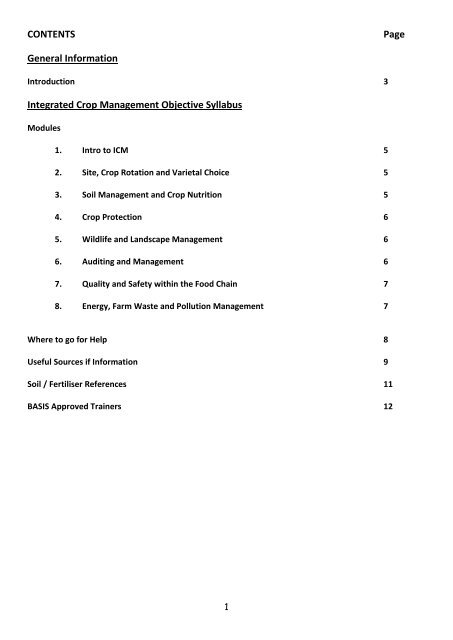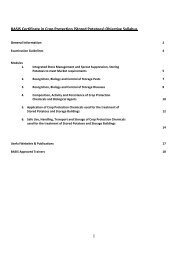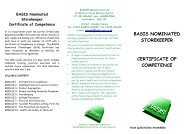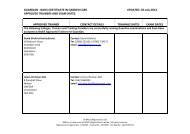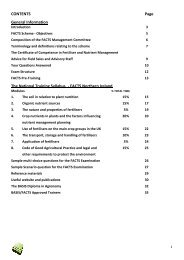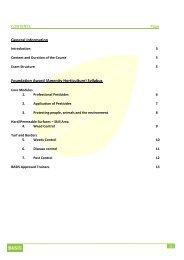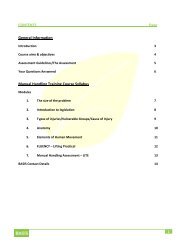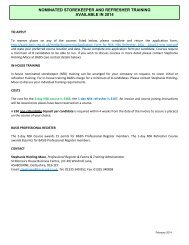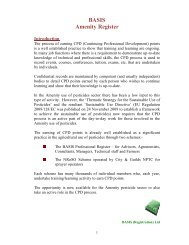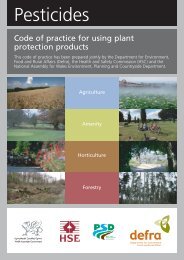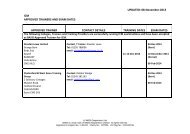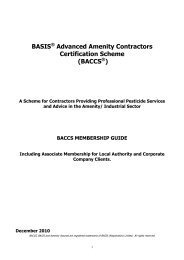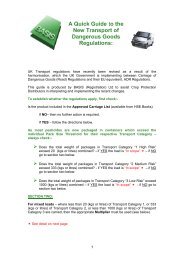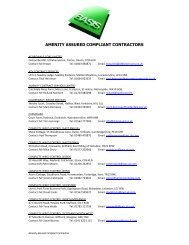BASIS/LEAF ICM course
BASIS/LEAF ICM course
BASIS/LEAF ICM course
Create successful ePaper yourself
Turn your PDF publications into a flip-book with our unique Google optimized e-Paper software.
CONTENTS<br />
Page<br />
General Information<br />
Introduction 3<br />
Integrated Crop Management Objective Syllabus<br />
Modules<br />
1. Intro to <strong>ICM</strong> 5<br />
2. Site, Crop Rotation and Varietal Choice 5<br />
3. Soil Management and Crop Nutrition 5<br />
4. Crop Protection 6<br />
5. Wildlife and Landscape Management 6<br />
6. Auditing and Management 6<br />
7. Quality and Safety within the Food Chain 7<br />
8. Energy, Farm Waste and Pollution Management 7<br />
Where to go for Help 8<br />
Useful Sources if Information 9<br />
Soil / Fertiliser References 11<br />
<strong>BASIS</strong> Approved Trainers 12<br />
1
© <strong>BASIS</strong> (Registration) Ltd<br />
<strong>BASIS</strong> is a trade mark of <strong>BASIS</strong> (Registration) Limited. All rights reserved.<br />
Registered in England No.: 1365343 Charity No.: 1077006 VAT Reg No.: 242/5497/56<br />
2
THE <strong>BASIS</strong>/<strong>LEAF</strong><br />
INTEGRATED CROP MANAGEMENT COURSE<br />
Introduction<br />
The implementation of Integrated Crop Management (<strong>ICM</strong>) is a progressive step towards developing a<br />
system that truly addresses the concerns of consumers, environmentalists and farmers - a system that can<br />
produce quality food with sensitivity for the environment, whilst maintaining a financially profitable<br />
business for farmers.<br />
Building on the Codes of Good Agricultural Practice, Integrated Crop Management is a whole farm<br />
approach that is practical and achievable for farmers, acceptable in the eyes of the consumer and is a key<br />
option for government for the responsible use of pesticides in the UK and throughout Europe.<br />
Furthermore <strong>ICM</strong> provides a sound basis for the development of farm assurance schemes.<br />
The <strong>BASIS</strong>/<strong>LEAF</strong> <strong>ICM</strong> <strong>course</strong> has been designed to provide an insight into Integrated Crop Management for<br />
anyone who is involved, directly or indirectly, in food production. The <strong>course</strong> has been developed to<br />
ensure a common standard for Integrated Crop Management understanding and uptake through<br />
promotion and advice. The <strong>course</strong> does not qualify the individual to be <strong>BASIS</strong> or FACTS certificated but it<br />
plays a fundamental part in the development of any adviser.<br />
About <strong>ICM</strong><br />
Integrated Crop Management (<strong>ICM</strong>) is a common sense approach to farming. It combines the best of<br />
traditional methods with appropriate modern technology, balancing the economic production of crops<br />
with positive environmental management.<br />
The fundamental approach of <strong>ICM</strong> is that of informed management across the whole farm, which focuses<br />
on attention to detail in all practices.<br />
It is also dynamic in that it can be adapted to incorporate new concepts as they are perfected. Precision<br />
farming methods which are being developed will almost certainly be compatible and consistent with<br />
Integrated systems.<br />
3
About <strong>LEAF</strong><br />
Linking Environment and Farming (<strong>LEAF</strong>) develops and promotes Integrated Crop Management (<strong>ICM</strong>). It<br />
aims to:<br />
Encourage the uptake of <strong>ICM</strong> through the development of practical guidelines and the <strong>LEAF</strong> Audit;<br />
Promote <strong>ICM</strong> through the setting up of <strong>LEAF</strong> Demonstration Farms and <strong>LEAF</strong> Innovation Centres by<br />
arranging visits to these farms for both farmers and non farmers.<br />
<strong>LEAF</strong> is a charitable body working with many other organisations. There are similar organisations to <strong>LEAF</strong><br />
working in other European countries.<br />
About <strong>BASIS</strong><br />
<strong>BASIS</strong> is an independent registration, standards, certification and training organisation (serving pesticide,<br />
fertiliser, horticulture, forestry and other relevant interests), working with and through industry<br />
organisations to implement relevant sections of ‘The Food and Environment Protection Act 1985’ and<br />
other legislative and industry Code of Practice requirements.<br />
Other activities of <strong>BASIS</strong> include the annual assessment of pesticide supply stores under The Food &<br />
Environment Protection Act 1985 and the running of training <strong>course</strong>s and examinations for industry staff.<br />
It also administers a certification scheme for sales and advisory staff working in the fertiliser industry<br />
(FACTS). More recently BETA (Biodiversity and Environmental Training for Advisers) and the <strong>BASIS</strong> Soil &<br />
Water Management Certificate have been added to provide advisers with a more rounded agronomy<br />
profile.<br />
The <strong>BASIS</strong> Professional Register and PROMPT (Professional Register for Managers and Pest Control<br />
Technicians) are recognised industry schemes for Continuing Professional Development (CPD), recognised<br />
by Government.<br />
Whistle Blowing Policy<br />
<strong>BASIS</strong> (Registration) Ltd is committed to the highest standards of openness and accountability. Therefore,<br />
we expect employees, candidates and others who work with <strong>BASIS</strong> who have serious concerns about any<br />
aspect of our work voice those concerns.<br />
To this effect <strong>BASIS</strong> has a whistle Blowing Policy. This procedure is designed to allow concerns of a public<br />
interest kind within <strong>BASIS</strong> to be raised, investigated and where appropriate, acted upon. Complaints may<br />
be any member of staff, candidates or those contracted to provide services to <strong>BASIS</strong>.<br />
To view the full Whistle Blowing Policy go to:<br />
http://www.basis-reg.co.uk/media/documents/430/index.html<br />
Dyslexia Policy<br />
<strong>BASIS</strong> (Registration) Ltd allows students diagnosed with Dyslexia to request special examination<br />
arrangements. Proof of dyslexia is required a minimum of 4 weeks before the exam date so that <strong>BASIS</strong> can<br />
provide special examination arrangements if required.<br />
For a full copy of our Dyslexia Policy please go to:<br />
http://www.basis-reg.co.uk/media/documents/TM%2015%20<strong>BASIS</strong>%20Dyslexia%20Policy%20-<br />
%20Sept%202011.pdf<br />
4
<strong>BASIS</strong> /<strong>LEAF</strong><br />
INTEGRATED CROP MANAGEMENT<br />
OBJECTIVE SYLLABUS<br />
MODULE 1 - INTRODUCTION TO <strong>ICM</strong><br />
The candidate will:<br />
<br />
appreciate the features, components and benefits of <strong>ICM</strong> (based on the module in the training pack)<br />
MODULE 2 - SITE, CROP ROTATION AND VARIETAL CHOICE<br />
The candidate will:<br />
<br />
<br />
<br />
<br />
assess the effect of site features when selecting a crop rotation<br />
consider the significance of the various factors influencing choice of rotation<br />
appreciate the environmental impact of contrasting rotations<br />
assess the effect of varietal choice and seed quality on achieving the aim of <strong>ICM</strong>.<br />
MODULE 3 - SOIL MANAGEMENT AND CROP NUTRITION<br />
The candidate will:<br />
<br />
<br />
<br />
<br />
<br />
<br />
<br />
<br />
<br />
<br />
<br />
<br />
identify and assess soil properties in relation to agricultural management and for the prevention of soil<br />
erosion<br />
appreciate the value and use of technology in planned cultivation systems<br />
be aware of the factors to be taken into account for fertiliser management plans for a field situation<br />
assess the environmental impact of management decisions and the policy adjustments required by<br />
legislation and Codes of Good Practice<br />
appreciate the value and use of technology in water resource and irrigation management<br />
evaluate the efficiency of operation and safety of a range of equipment<br />
evaluate the suitability and legality of fertiliser storage and associated signs<br />
appreciate and understand the content of RB209 (fertiliser recommendations for agricultural and<br />
horticultural crops)<br />
understand the appropriate law and good practice procedures for the transport of fertilisers<br />
understand the importance of protecting non-crop areas from fertiliser applications<br />
appreciate the relationship between ground-water and Nitrates / NVZ’s and the protection of water<br />
quality<br />
understand the situation relative to phosphate and eutrophication<br />
5
MODULE 4 - CROP PROTECTION<br />
The candidate will:<br />
<br />
<br />
<br />
<br />
<br />
<br />
appreciate the importance of crop monitoring in evaluating crop protection problems and in the design<br />
of integrated control strategies<br />
understand the value of existing information technology and expert systems used in crop protection<br />
decision making<br />
evaluate the consequences of pesticide application and the significance of reduced/restricted use and<br />
developments in biotechnology<br />
specify the conditions and procedures required for safe, accurate and economic application<br />
be familiar with techniques for the safe disposal of chemicals and their containers<br />
appreciate the requirements of legislation, Codes of Conduct and safe working practices<br />
MODULE 5 - WILDLIFE AND LANDSCAPE MANAGEMENT<br />
The candidate will:<br />
<br />
<br />
<br />
<br />
<br />
appreciate the inter-relationships between enterprises in a land use system<br />
understand the role of government and non-government organisations involved with conservation<br />
issues<br />
be aware of the factors which contribute to the conservation status of an area<br />
consider the criteria involved in selecting specially protected areas<br />
be aware of the agronomic benefits of conservation practices<br />
MODULE 6 - AUDITING AND MANAGEMENT<br />
The candidate will:<br />
<br />
<br />
<br />
<br />
<br />
appreciate the importance of detailed records, planning and good management in a successful <strong>ICM</strong><br />
system<br />
identify long and short term farm business objectives<br />
familiarise staff and contractors with farm policies and objectives<br />
consider methods of evaluating current farm practice and of reviewing performance with targets and<br />
timescales for improvement<br />
identify key management functions to achieve best practice in line with safety and legal requirements<br />
6
MODULE 7 - QUALITY AND SAFETY WITHIN THE FOOD CHAIN<br />
The candidate will:<br />
<br />
<br />
<br />
<br />
understand the issues of key importance to quality and food safety within the food chain<br />
identify the main legislation and regulations<br />
consider the key systems and standards for managing food quality and safety<br />
discuss the philosophy and principles underlying these systems and standards<br />
The candidate will:<br />
MODULE 8 - ENERGY, FARM WASTE AND POLLUTION MANAGEMENT<br />
<br />
<br />
<br />
<br />
<br />
<br />
appreciate the range and scale of farm waste production, the likely re-use and recycling opportunities<br />
and potential pollution risks<br />
analyse the practical, environmental and financial implications of such wastes<br />
be conversant with the appropriate legislation and Codes of Good Agricultural Practice<br />
understand the need to improve the efficiency of energy use<br />
identify waste minimisation and resource management techniques<br />
initiate a specific farm waste and energy management plan based on the information provided.<br />
7
Who are they? Where are they? What do they do?<br />
WHERE TO GO FOR HELP<br />
<br />
<br />
<br />
<br />
<br />
<br />
<br />
<br />
<br />
<br />
<br />
<br />
<br />
<br />
<br />
<br />
<br />
<br />
<br />
<br />
<br />
<br />
<strong>BASIS</strong><br />
<strong>LEAF</strong> (Linking Environment And Farming)<br />
Game Conservancy<br />
Allerton Research and Educational Trust(ARET)<br />
Farming and Wildlife Advisory Group (FWAG)<br />
National Farmers Union (NFU)<br />
Crop Protection Association (CPA)<br />
ADAS<br />
Manufacturing companies<br />
National Association of Agricultural Contractors (NAAC)<br />
Consultants<br />
Distributor companies<br />
DEFRA<br />
The Pesticide Forum<br />
Pesticide Safety Directorate (PSD)<br />
LANTRA<br />
NPTC<br />
Health and Safety Executive (HSE)<br />
The Environment Agency (EA)<br />
Scottish Environment Protection Agency (SEPA)<br />
Agricultural Industries Confederation (AIC)<br />
Environment & Heritage Service Northern Ireland (EHSNI)<br />
8
USEFUL SOURCES OF INFORMATION<br />
England & Wales<br />
MAFF Code of Good Agricultural Practice for the Protection of WATER, AIR and SOIL<br />
MAFF Codes of recommendations for the welfare of livestock<br />
Scotland<br />
SOAFD Code of Good Practice for the Protection of Environmental Pollution from Agricultural Activity<br />
Northern Ireland<br />
Countryside management booklets: Trees, Water and Field Boundaries<br />
Other information<br />
FEPA (Part III) 1985 and COSHH regulations 1994<br />
Pesticides: Code of Practice for the Safe Use of Pesticides on Farms and Holdings 1997<br />
Control of Pesticides Regulations 1986<br />
The Food Safety Act 1990<br />
Guidelines for Integrated Crop Management (<strong>LEAF</strong> 1995)<br />
A Practical Guide to Integrated Crop Management (<strong>LEAF</strong> 1994)<br />
The <strong>LEAF</strong> Audit (<strong>LEAF</strong> 1997)<br />
Integrated Crop Management (BAA, <strong>LEAF</strong>, ATB Landbase, Sainsbury’s 1996)<br />
Guidelines for Environmentally Responsible Farming (FWAG 1991)<br />
Arable Farming and Set-aside (FWAG 1993)<br />
Guidelines for the Protection of Non-target species (BAA 1997)<br />
MAFF - Pesticides & Integrated Farming<br />
Using Pesticides: A Complete Guide to Safe, Effective Spraying (Oct 1999)<br />
(ISBN 1-901396-01-0)<br />
The BCPC Publications Sales, 7 Omni Business Centre, Omega Park, Alton, Hampshire, GU34 2QD (Tel:<br />
01420 593200)<br />
Guidance on Storing Pesticides and Farmers and Other Professional Users.<br />
Agricultural Information Sheet AIS No. 16<br />
HSE Books, PO Box 1999, Sudbury, Suffolk, C010 6FS (tel: 01787 881165)<br />
Pesticides: Code of Practice for the Safe Use of Pesticides on Farms and Holdings<br />
(ISBN-0-11-242892-4)<br />
The Stationery Office, PO Box 276, London, SW8 5DT<br />
Boom Sprayers Handbook<br />
(ISBN 0-948404-50-7)<br />
The BCPC Publications Sales, Bear Farm, Binfield, Bracknell, Berkshire, RG42 5QE<br />
(tel: 0118 943 2727)<br />
Guidelines for the Safe Formulation and Packaging of Pesticides<br />
GIFAP, Avenue Albert Lancaster 79A, 1180 Brussels, Belgium<br />
9
Guidelines for the Safe and Effective Use of Pesticides<br />
GIFAP, Avenue Albert Lancaster 79A, 1180 Brussels, Belgium<br />
Weed Guide<br />
Bayer CropScience Ltd, Hauxton, Cambridge, Cambridgeshire, CB2 5HU<br />
FWAG Farming and Pesticides<br />
Farming and Wildlife Advisory Group, NAC, Stoneleigh, Kenilworth, Warwickshire, CV8 2RX<br />
Understanding Buffer Strips: An Information Booklet<br />
The Environment Agency, Rivers House, Waterside Drive, Aztec West, Almondsbury, Bristol, Avon, BS12<br />
4UD (tel: 01454 624400)<br />
Publications by Crop Protection Association<br />
Crop Protection Association, 4 Lincoln Court, Lincoln Road, Peterborough, PE1 2RP (tel: 01722 349225)<br />
Think Water - Keep It Clean<br />
Container Rinsing Leaflet<br />
Glove Hygiene<br />
Pesticide Disposal<br />
The COSHH Assessment: A Plain Man’s Guide<br />
Good Agrochemical Storage<br />
Pesticides and Water Quality<br />
Pesticides and Human Health<br />
Pesticides and Food Safety<br />
Integrated Crop Management<br />
Weed Control and Environmental Protection<br />
Department of the Environment ISBN 011 752708 4<br />
Guidance for Control of Weeds on Non-Agricultural Land<br />
Department of the Environment 92 EP 240<br />
10
SOILS/FERTILER REFERENCES<br />
Fertiliser recommendations for Agricultural and Horticultural Crops (RB209) 7th edition,<br />
2000 (TSO)<br />
Crop Nutrition and fertiliser use - John Archer<br />
Soil management - D B Davies, D J Eagle and B Finney<br />
Schering field crops nutrient disorders guide<br />
Fertilisers and manures - Ken Simpson<br />
Soil Assessment - SAWMA, ADAS & BP<br />
Diagnosis of mineral disorders in plants - principles - MAFF/ARC (HMSO)<br />
Fertiliser Reviews (FMA)<br />
FMA Publications<br />
Lime and Liming - MAFF Book No 35 (HMSO)<br />
Code of Practice for Agricultural Use of Sewage Sludge (HMSO)<br />
Trade leaflets e.g The Hydro Agricultural and Fertiliser Handbook - Immingham<br />
Farming, Fertilisers and the Nitrate Problem - T M Addiscott<br />
- A P Whitmore<br />
- D S Powlson<br />
General<br />
Crop husbandry - Lockhart and Wiseman (New Ed in press)<br />
Halleys - Agricultural notebook<br />
11
<strong>BASIS</strong> APPROVED TRAINERS<br />
The following Colleges, Trainers and Training Providers are successfully running <strong>ICM</strong> examinations and<br />
have been accepted as <strong>BASIS</strong> Approved Trainers for <strong>ICM</strong>.<br />
Alasdair Lowe Limited<br />
Contact: Alasdair Lowe<br />
Grange Barn Tel: 01295 788006<br />
Birds Lane<br />
Email: alowe@alasdairlowe.co.uk<br />
Epwell<br />
BANBURY<br />
Oxfordshire, OX15 6LQ<br />
Chelmsford & West Essex Training Group<br />
Contact / Trainer: Debbie Wedge<br />
2 Salisbury Cottages Tel: 01245 381193<br />
Maldon Road<br />
Email: debbiewedge@aol.com<br />
Hatfield Peverel<br />
CHELMSFORD<br />
Essex, CM3 2HS<br />
David Godsmark<br />
Contact / Trainer: David Godsmark<br />
Swallowfield Tel: 01243 543834<br />
Eastergate Lane<br />
Email: dgodsmark@lineone.net<br />
Eastergate<br />
CHICHESTER<br />
West Sussex, PO20 6SJ<br />
Dorset Training Ltd<br />
Contact: Amanda Smith<br />
PO Box 5002 Tel: 01305 263125<br />
DORCHESTER<br />
Email: dorsettraining@btinternet.com<br />
DT1 2WD<br />
Hampshire Training Providers Ltd<br />
Contact: Jenny Lewis<br />
c/o Hampshire Grain Limited Tel: 01962 774430<br />
Overton Road<br />
Email: jenny@hampshire-training.co.uk<br />
Micheldever Station<br />
Trainer: Julian Lewis<br />
WINCHESTER<br />
Hampshire, SO21 3AN<br />
James Christian-Ilett<br />
Contact: James Christian-Ilett<br />
8 Painshall Close Tel: 01673 860925<br />
Welton Fax: 01673 860925<br />
LINCOLN<br />
Email: christian.ilett@btinternet.com<br />
Lincolnshire, LN2 3NU<br />
Mid Kent Training<br />
Contact: Dianne Quested<br />
Kempes Corner Farm Tel: 01233 813688<br />
Boughton Aluph Fax: 01233 813533<br />
ASHFORD<br />
Email: info@mkt.uk.net<br />
Kent, TN25 4EN<br />
12
SRUC<br />
Contact: Moyra Farquhar<br />
Kings Buildings Tel: 0131 5354090<br />
West Mains Road<br />
Email: moyra.farquhar@sruc.ac.uk<br />
EDINBURGH<br />
Trainers: Rob Fuchs & Martin Richards<br />
EH9 3JG<br />
Web: www.sruc.ac.uk<br />
University of Lincoln<br />
Contact / Trainer: Dr Simon Goodger<br />
Riseholme Park Tel: 01522 5895295<br />
LINCOLN<br />
Email: sgoodger@lincoln.ac.uk<br />
Lincolnshire<br />
LN2 2LG<br />
The Vale Training Group<br />
Contact: Kate Mason<br />
Marsh Hill Farm Tel: 01296 612201<br />
Marsh<br />
Email: kate@valetraining.co.uk<br />
AYLESBURY<br />
Trainer: Debbie Wedge<br />
Buckinghamshire, HP17 8ST<br />
The following Colleges, Trainers and Training Organisations have expressed an interest in running some,<br />
or all, of the training modules and / or the <strong>ICM</strong> examination.<br />
Duchy College<br />
Contact: Kath Strang<br />
Stoke Climsland Tel: 01579 372222<br />
CALLINGTON<br />
Email: kath.strang@duchy.ac.uk<br />
Cornwall<br />
Trainer: Alex Stephens<br />
PL17 8PB<br />
Holbeach Marsh Training Group<br />
Contact: Lynne Richardson<br />
27 Sorrel Drive Tel: 01775 762977<br />
SPALDING<br />
email: lynne.richardson@hmtg.co.uk<br />
Lincolnshire<br />
PE11 3GN<br />
Ian Gower Associates Ltd<br />
Contact: Ian Gower<br />
7 Blean Square Tel: 01622 675130<br />
Vinters Park<br />
Email: ian@pesticides-safetytraining.co.uk<br />
MAIDSTONE<br />
Kent, ME14 5QU<br />
Royal Agricultural University<br />
Contact: James Foster<br />
Stroud Road Tel: 01285 889873<br />
CIRENCESTER<br />
email: rsc@rac.ac.uk<br />
Gloucestershire<br />
Web: www.rac.ac.uk<br />
GL7 6JS<br />
Trainer: Tom Overbury<br />
The Training Association (East)<br />
Contact: Jayne Parsey<br />
High Cottage Tel: 01485 600225<br />
St Andrews Lane<br />
email: jayne@traineast.co.uk<br />
Congham<br />
Web: www.traineast.co.uk<br />
KINGS LYNN<br />
Norfolk, PE32 1DS<br />
13
02 October 2013<br />
14


